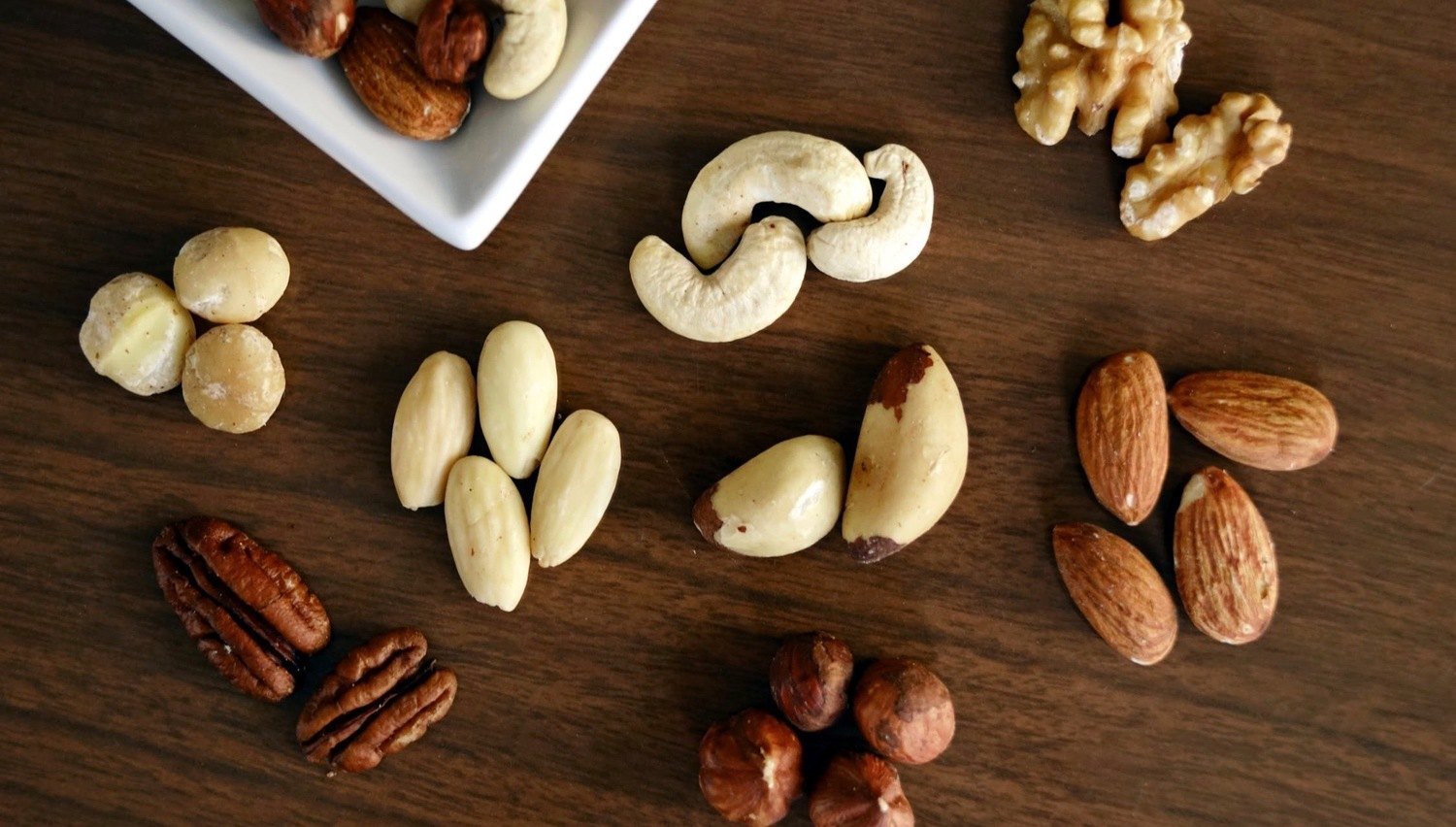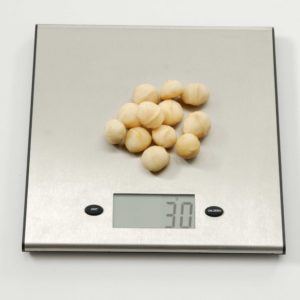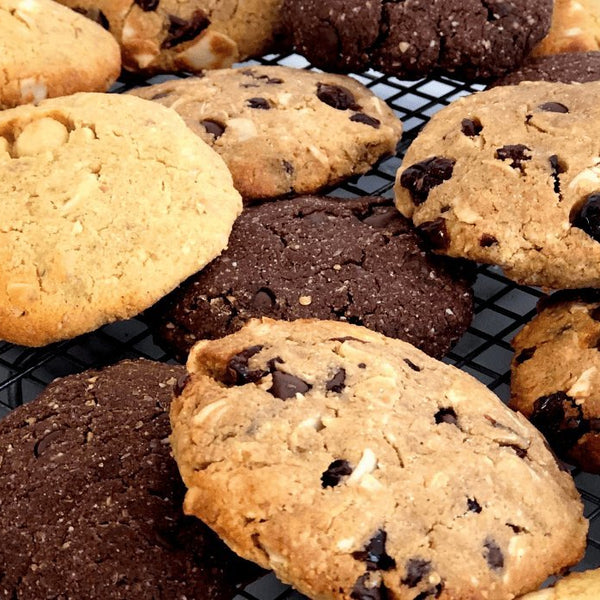
Top 10 LOW CARB Nuts: the Definitive List
Crunchy, sweet, salty…nuts come in all shapes, sizes and varieties! But, did you know that not all are created equal when it comes to their carb content? Whilst nuts are typically seen as a convenient low carb option, it may not be as low carb as you thought…
PBCo is here to help! This list is in descending order of carb content, and we’ve done the macro maths for you, so you can make the best choice. Keep in mind that this is per 100g, and the recommended daily serving is 30g-50g (handful or two) according to Nutrition Australia. Happy snacking! |
10. ChestnutsPer 100g: Carbs: 29.7g – Protein: 2.4g – Fat: 0.7g Fun fact: Chestnuts are the only nut that's low in fat. Fresh chestnuts are a rare find in Oz; the sweet, starchy and nutty dry-roasted ones that you'll come across now and then - albeit a delicious treat - offer very little in the way of protein, but a lot in the way of carbs! They're particularly high in filling, gut-loving fibre though, with 100g having close to 14g dietary fibre; that's around double the fibre content of other nuts on average. Per (30g) Carbs: 8.9g – Protein: 0.7g – Fat: 0.2g |
 |
9. CashewsPer 100g: Carbs: 16.8g – Protein: 17g – Fat: 49.2g There’s a reason creamy cashews are one of the key ingredients in all those in-vogue vegan raw, desserts: they’re naturally sweet, hence the higher carb content! That’s not to say cashews aren’t full of beneficial nutrients - including minerals like iron, zinc and magnesium - but if you’re watching your carb intake, we wouldn’t be snacking on these mindlessly straight from the packet! Per (30g) Carbs: 5g – Protein: 5.1g – Fat: 14.8g |
 |
8. PeanutsPer 100g: Carbs: 8.9g – Protein: 24.7g – Fat: 47.1g Did you know that the peanut is technically a legume? (So it's actually more of a pseudo-nut, but we'll call it a nut for the sake of this post!). Don’t diss peanuts because of their higher carb content; they are the highest in protein of all the nuts, with a tablespoon of 100% peanut butter being significantly higher in protein than other nut butters, giving you 6g of protein and only just over 2g of carbs. Want to learn which Australian Peanut Butter Brands are the best? Check out our blog here to see which are the healthiest on the market. Per (30g) Carbs: 2.7g – Protein: 7.4g – Fat: 14.2g |
 |
7. PistachiosPer 100g: Carbs: 6.8g – Protein: 19.7g – Fat: 50.6g Despite their higher carb content, pistachios are the second highest in protein after peanuts, so remember to look at the whole picture/all the macros, peeps! I like the kind of sweet/kind of savoury flavour profile of this gorgeous green nut, which means it works well in a variety of dishes. Plus, pistachios - along with macadamias - set themselves apart from the other nuts in that they’re rich in plant sterols - plant compounds with a cholesterol-lowering effect. Per (30g) Carbs: 2g – Protein: 5.9g – Fat: 15.2g View our Cranberry and Pistachio Protein Bar recipe here. |
 |
6. HazelnutsPer 100g: Carbs: 5.1g – Protein: 14.8g – Fat: 61.4g Score! I actually thought hazelnuts would be higher up on the list because to me they taste pretty sweet (and also probably because I associate them with a certain commercial chocolate spread). If you’re craving something sweet but don’t want to go crazy on the carbs, hazelnuts a good nut to go with. Try a handful in a homemade trail mix with a square of 85-90% dark chocolate chopped into chunks, add them to your pancake stack or check out our amazing Halo Top & Protein Pancake Waffle Ice-Cream Sandwich. Per (30g) Carbs: 1.5g – Protein: 4.4g – Fat: 18.4g |
 |
5. PecansPer 100g: Carbs: 4.9g – Protein: 9.8g – Fat: 71.9gCreamy in texture and subtly sweet, pecans provide nutrients like magnesium and energising B vitamins. The pecan is also one of the nuts richest in heart-healthy monounsaturated fats - the same kind of ‘good fats’ you get in olive oil. Per (30g) Carbs: 1.5g – Protein: 2.9g – Fat: 21.6g |
 |
4. AlmondsPer 100g: Carbs: 4.8g – Protein: 19.5g – Fat: 54.7g The most popular ‘snack nut’, almonds are awesome cos they taste kinda sweet, while also happening to be low in carbs...they’re also one of of the higher protein nuts and an excellent source of antioxidant-rich vitamin E. I like buying the portion controlled boxes/packets of raw almonds so I don’t go overboard (look for brands like Lucky Nuts in the baking aisle at the supermarket - they do 30g snack-sized boxes). Tamari almonds (dry-roasted in gluten free soy sauce) from the health food store are also awesome if you're in a snack rut. Per (30g) Carbs: 1.4g – Protein: 5.8g – Fat: 16.4g |
 |
Equal 3rd. MacadamiasPer 100g: Carbs: 4.5g – Protein: 14.8g – Fat: 76.2g Yay for macadamias being lower down on the list, cos they’re just so darn good...Now if only they weren’t so $$! Lower carb content aside, macadamias are also loaded with monounsaturated fat - one of the nutrients that are a big part of the Mediterranean diet. Also the star ingredient in one of our all-time favourite recipe Low Carb White Chocolate Macadamia Cookies Per (30g) Carbs: 1.4g – Protein: 2.3g – Fat: 22.9g |
 |
Equal 3rd. Pine NutsPer 100g: Carbs: 4.5g – Protein: 13g – Fat: 70g More of a salad-nut than a snack-nut, pine nuts are a particularly good source of manganese, important for bone health. Try pine nuts dry-toasted in a pan to bring out their rich, buttery flavour. Sprinkle over whatever greens you’re having to make them that little more special; I like a handful of toasted pine nuts on a simple rocket and parmesan salad dressed with olive oil, lemon juice, salt and pepper. Per (30g) Carbs: 1.4g – Protein: 3.9g – Fat: 21g |
 |
2. WalnutsPer 100g: Carbs: 3g – Protein: 14.4g – Fat: 69.2g My go-to nut for snacking, the walnut is the only nut - and one of the few plant-based foods - that contains omega-3, an essential fatty acid (meaning we need to obtain it from our diets). Amongst its many benefits, omega-3 plays an important role in cognitive function (fitting, seeing that the walnut is shaped like a brain), and bringing down inflammation in the body. If you’re not a fan of oily fish (read: tuna, salmon and sardines), which is the richest food source of omega-3, then walnuts are the nut to be snacking on...they are also super yummy toasted in the press toaster for a few minutes. Or add them to your favourite cakes or muffins. Banana Bread, Carrot Cake, Apple Teacake or cookies! Per (30g) Carbs: 0.9g – Protein: 4.3g – Fat: 20.8g |
 |
1. Brazil NutsPer 100g: Carbs: 2.4g – Protein: 14.4g – Fat: 68.5g...And we have a winner! Along with being THE lowest carb nut, just two creamy, crunchy Brazil nuts which have been cultivated in selenium-rich soil will give you the recommended daily amount of selenium. Not only a mineral, selenium is a powerful antioxidant, meaning it can help ward off oxidation/damage to our cells by the highly unstable and reactive compounds, i.e, free radicals. Per (30g) Carbs: 0.7g – Protein: 4.3g – Fat: 20.6g |
The Health Benefits of Nuts
Nuts are edible, high in fat seed kernels usually enclosed by a hard shell. They’re widely eaten as a snack or used in cooking. Nuts are super versatile and can be turned into different forms such as dairy-free milk and flour alternatives. Nuts have an impressive nutritional profile and are associated with many health benefits. A friendly reminder that the recommended daily serving is 30g-50g (handful or two) according to Nutrition Australia.General Nutritional Value
Nuts are a rich source of dietary fibre, protein and healthy fats such as poly- and monounsaturated fat. The combination of these three can keep you feeling fuller for longer and reduces the tendency to snack throughout the day. With a low carbohydrate content, these top 10 nuts are also a suitable snack option or ingredient for those following a high protein, low carb or ketogenic diet. A low carb diet has been proven to be an effective way to lose weight and manage fat loss, which is why we love adding this versatile food to our recipes! One of all all-time favourites is almonds – you can have almond milk, almond flour or almond meal!Reduces Risk for Heart Diseases
Vitamin E, also known as gamma-tocopherol, is a powerful antioxidant that enhances our body’s immune function and prevents arteries clogging in the heart. Antioxidants also help to reduce body-wide dangerous inflammation from leading to various diseases such as heart disease, cancer and diabetes. Certain nuts such as pistachios and hazelnuts, have been found to help lower “bad” LDL cholesterol levels and triglycerides, which are two major factors for heart disease.Supports Thyroid Function Through Selenium
Selenium is an important mineral, found in brazil nuts, needed to produce thyroid hormones as well as protection against oxidative damage. Deficiency in selenium is one of the leading causes of thyroid disorders, including hypothyroidism and hyperthyroidism. The thyroid gland is responsible for regulating body temperature, heart rate, the production of protein, and controlling the rate of your metabolism, just to name a few functions.Low Carb Nuts: Your Burning Questions Answered
Now let’s answer some of the most common questions and misconceptions regarding nuts and macros content.Q. Are nuts Gluten Free?
A. Yes! Nuts in their pure form don’t contain any gluten, unless they’re processed in a facility which uses gluten. When in doubt, read the label carefully! For example, dry roasted nuts often use wheat flour in their coating.Q. What are the best nuts for a Keto diet?
A. This definitive list has detailed the best low carb nuts, which are also suitable for keto dieters! Rest assured, you can eat any of the nuts on this list and popular choices are often almonds, macadamia and brazil nuts. These are great as a keto snack (combine a few to make delicious mixed nuts!), but you can also consume these nutrients in nut butter or milk form, which you can read about in our keto friendly Low Carb Milk blog. Another way to incorporate nuts into your diet is through baking! Read on for the best tips and tricks 👩Q. What are the best nuts to use in baking?
A. Baking with buts is a great way to add crunch, protein, and extra nutritious goodness to your baked goodies! As a mix-in, nuts add flavour and texture, but their versatility calls for other ways to incorporate them into baking. For example, many nuts can be turned into milk (lactose free and vegan) as well as flour. At PBCO, we particularly love using unsweetened almond milk and almond flour or almond meal in our baked goods.Almonds
Almonds are by far one of the most versatile nuts in baking. It has a mild, rich flavour and can be purchased whole, sliced, slivered or chopped. Blanched almonds mean their skin has been removed. We recommend our Gluten Free Almond Biscuits. Inspired by the Italian Amaretti biscuits, these biscuits are also keto friendly and easy to make! We love having these with a nice strong coffee for afternoon tea.Brazil Nuts
You may not have seen much of brazil nuts in baking, but it has a rich, creamy flavour. As you may have noticed, brazil nuts are the lowest carb nut and rich in selenium. We love adding brazil nuts into our Keto Granola. This recipe gives you the flexibility to choose your favourite nut and seed combinations – the possibilities are endless! Make this a quick and healthy brekkie by pairing it with Greek yoghurt.Macadamias
Also known as the Queensland nut, macadamia are commonly used with light flavours like white chocolate. High in oil, macadamias have a deep buttery flavour when baked. Some say it tastes a bit like coconut too – what do you think? Of course, we would recommend the classic cookie combo – White Choc Macadamia Cookies. These cookies are high in protein, keto-friendly and shines a spotlight on the crunchy deliciousness of macadamias!Walnuts
Walnuts have a mild, buttery flavour that makes them perfect in cakes and cookies. It is recommended to use raw walnuts to prevent them from burning too fast, due to its high oil content. Our favourite baked treat with walnuts is Cinnamon and Walnut Cake. This low carb cake is the perfect afternoon tea treat with only 6g carbs per serve! Q. How should nuts be stored?
A. Since nuts are high in fats, the general rule is the higher the fat content, the faster they will go bad. Nuts should always be stored in airtight containers. Shelled nuts can be stored in a dry, cool location for up to three months. Shelled or unshelled nuts can be refrigerated for up to six months or frozen (in a freezer bag) for up to one year. Tip: Place a label of the expiry date so you don’t forget! Which Low Carb Nut were you surprised by? Don't forget to share this with someone who might find this useful!References
- Images (excluding peanuts): Nuts for Life - www.nutsforlife.com.au
- Macros: Food Standards Australia New Zealand NUTTAB Database
- Peanut image: https://www.quora.com/Does-eating-peanuts-make-you-fat


